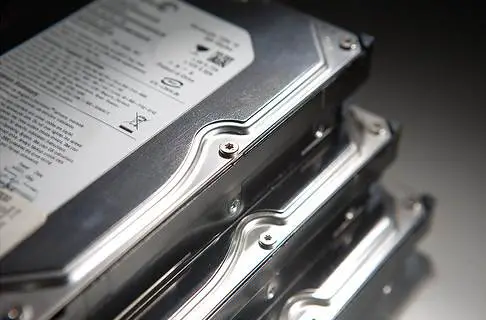 Not too long ago, it seemed as though less was more as cell phones got smaller and people tried to unclutter their lives. Now, despite our best efforts, clutter is back, phones are big and powerful, and more is definitely more. Hard drives are perhaps the most obvious example of the bigger is better trend. People can’t get enough of big hard drives. They want them in their computers, laptops, gaming consoles, and phones. Less than 10 years ago, 500MB was enough to keep the high-techiest techie happy; now, there are people who won’t consider anything less than 64GB.
Not too long ago, it seemed as though less was more as cell phones got smaller and people tried to unclutter their lives. Now, despite our best efforts, clutter is back, phones are big and powerful, and more is definitely more. Hard drives are perhaps the most obvious example of the bigger is better trend. People can’t get enough of big hard drives. They want them in their computers, laptops, gaming consoles, and phones. Less than 10 years ago, 500MB was enough to keep the high-techiest techie happy; now, there are people who won’t consider anything less than 64GB.
Many people have been moved to ask: how big can hard drives go? Is there such a thing as too big?
Not if you’re a manufacturer
Hard drive manufacturers are working their collective tuchus off so that they can be the first to reach the next biggest milestone. In 2007, Hitachi Global Storage Technologies was the first on the block with a terabyte hard drive. People oohed and aahed. They were amazed. A few months later they were bored. So, Seagate fed them a 1.5TB hard drive, but the insatiable public wanted more. In 2011, Seagate once again delivered the goods, this time with a 4TB, and that’s where it’s stopped, almost.
You see, size is great, but people also want reliability. They want performance. It’s no good having a Porsche 911 if the engine is full of holes.
Seagate is determined to deliver. In April 2013, in an article on neowin.net, Steven Parker reported that Seagate has produced another world first: a 4TB drive comprising four 1TB platters. The four platters, apparently, ramp up the drive’s performance while doubling its capacity. The great thing for techies out there is that the design also makes the drive more affordable. Affordable being approximately $210.
[Recommended read: Benefits of Using An External Hard Disk Drive]
Laptops get in on the action
Western Digital was in the initial battle for terabyte hard drive supremacy, before Seagate pretty much stole the show. But, it didn’t give up; it just changed tack. It’s a strategy that seems to have worked because it can now be considered the leading manufacturer in terabyte hard drives for laptops.
In May 2013, Damon Poeter reported that Western Digital has launched a 1.5TB hard disk drive for laptops. Laptops, even powerful ones, have never been able to hold a candle to computers when it comes to hard drives, but 1.5TB certainly does it’s bit to make them that much more competitive.
Gaming consoles won’t be left behind
Sony is about to release its much anticipated PlayStation4. This alone has the public champing at the bit, but the company has added an extra teaser, saying that the console will have a ‘very large hard drive’. That’s it though; no further details are, as yet, available.
[Read also: 5 Uses for Hard Drives Old and New (That you may not have thought of)]
Is there such a thing as too big?
 Matthew Murray seems to think so; in fact, Murray says that hard drives are getting so big that they are on the verge of becoming unusable, at least that’s what he said in an article he wrote on the dangers of extraordinarily large hard drives back in November 2010. At that point, we’d reached 2TB, which Murray thought was the threshold of what should be practically possible. It gets technical, with block size, capacity, BIOS, and MBR drives. The bottom line was that computers are physically unable to process drives that are bigger than 2.19TB.
Matthew Murray seems to think so; in fact, Murray says that hard drives are getting so big that they are on the verge of becoming unusable, at least that’s what he said in an article he wrote on the dangers of extraordinarily large hard drives back in November 2010. At that point, we’d reached 2TB, which Murray thought was the threshold of what should be practically possible. It gets technical, with block size, capacity, BIOS, and MBR drives. The bottom line was that computers are physically unable to process drives that are bigger than 2.19TB.
It comes down to compatibility. Massive hard drives aren’t compatible with computer systems. There are patches and ways in which the problems can be circumnavigated (GUID Partition Tables and Unified Extensible Firmware Interface, come into play), but operating systems would still have to make some adjustments to support these.
On the other hand, software is often used to fix mistakes when hardware isn’t quick to act. At any rate, it seems that computer manufacturers will have to make their operating systems evolve if they want to keep up with the times.
[Recommended read: How to Know if Your Computer Hard Drive is Failing?]
Then and now
That was then; this is now. We’ve got 4TB to play with now; we’ve got manufacturers refining their technology to make their drives simpler, better, and faster. And it doesn’t look like compatibility has been much of an issue, really.
So, can drives be too big? Probably not. But all other hardware involved will have to advance at an equal rate if we want to get full use out every terabyte of space available.
[Image 1 credit: Kenny Louie, Flickr] / [Image 2 credit: Kolby Schnelli, Flickr]

I kind of remember seeing 2 and maybe 3 TB drives a while back. Like computers and CPU’s I can’t keep up with them very well anymore.
I kind of lean towards speed, performance, and long lasting more than size. I think I would most likely get a new computer before I ever came close to filling a 4 TB drive.
My 500 GB drive is only about 1/5 full. I couldn’t imagine 4 TB’s, but I am sure there are people that can fill one up.
How big will they get? I have no idea. They say the sky is the limit right.
Who would use a 4TB HDD anyway? Any idea? 🙂
I guess maybe someone that is into a lot of video stuff. I don’t know what my digital camera actually uses for video encoding, but I recently recorded about a 4 minute video with it and it ended up being about 250 mb’s. It doesn’t do hd either it’s only 640×480, and the audio was 1 channel mono. I am thinking that could really add up fast if someone liked to record a lot of videos. Not really my thing, but every now and then I mess with them.
I still remember my first harddrive – 120MB 🙂 I was very happy with it and I thought I had enormous capacity 🙂
Mine was even smaller, I think 100MB I’m not so sure but definitely smaller. 🙂
I agree that the larger hard drives are a bit unnecessary. I like to save things on a flash drive instead of keeping all that data on my laptop.
…and they are still trying to make them even bigger.
These bigger hard drives have reached almost very near to the threshold value at which it can’t get any bigger. These teraByte Hard drives have already started showing some compatibility issues communicating with them. We may need some operating system adjustment in near future to communicate with these terabyte hard drives. For now its better to use some significant sized external storage device rather than going for a Bigger hard drive.
Yeah just stick to how much you need and works for you. Honestly, my current 250GB HDD is not even 50% full and since we have the cloud these days, I just don’t see why we need bigger hard drives. However, things will change and I might be “forced” to use one on the TB range one day who knows. Thanks for sharing your thoughts, Raj!
Try downloading HD movies & your HDD will be full in no time! 😀
Yeah I used to download movies and collect them but not anymore. I find this a waste of time and resources. What’s the point of downloading when you can just watch them stream online?
Hahahaa.. Nice point of online video streaming! 😀 😀 Between whats the average speed in your country?
In India, most of the home users are having speed of around 512kbps – 1mbps.. With this low speed, it becomes very difficult to watch hd videos online without buffering! 🙁 Only an elite group uses 2-4 mbps..
You’re kidding right? Is the speed in India really that slow? Yeah I wouldn’t care to watch any streaming videos with that kind of speed I’ll be fallen asleep. Our speed here is between 2 – 20 Mbps depending on which package the user afford and subscribed. Mine is 5 Mbps.
As of now, 5mbps is just a dream!
What the price for 5mbps unlimited usage plan in your country? In India, 1Mbps unlimited usage plan is around INR 600-900, depending upon the ISP..
5 Mbps plus free unlimited nation wide phone calls – US$45/month.